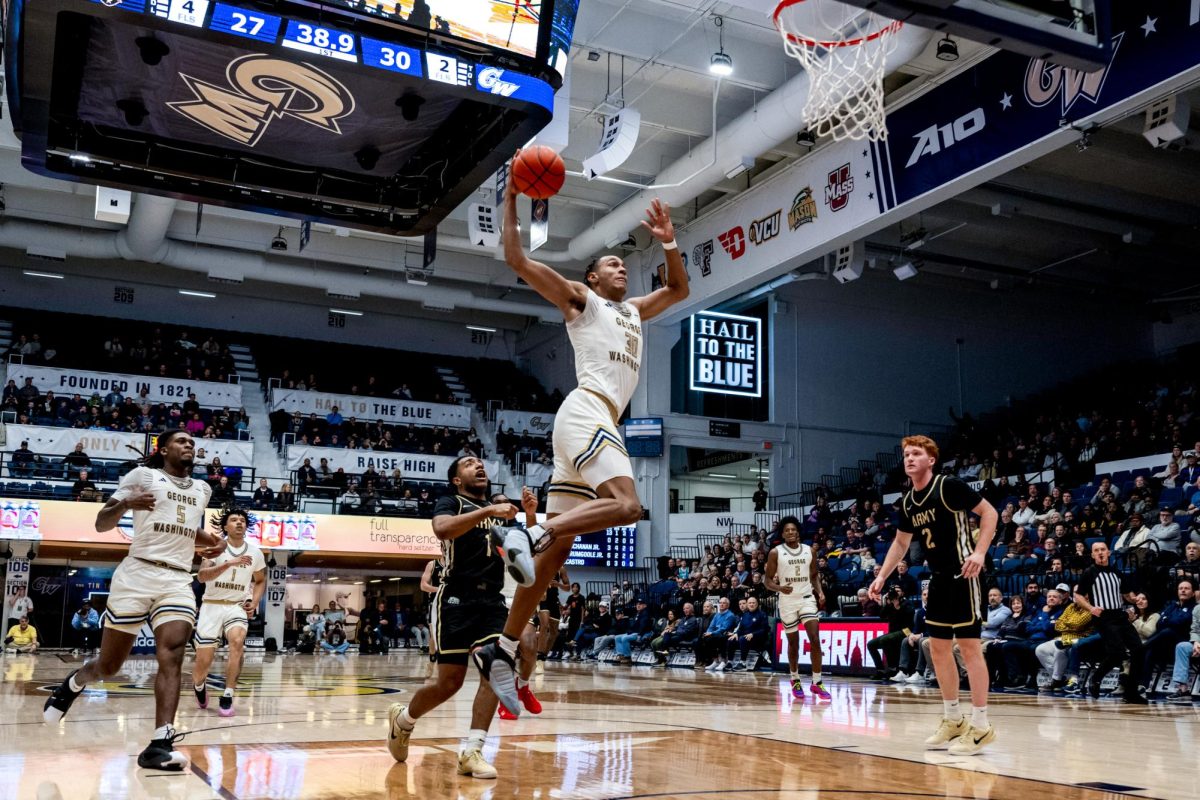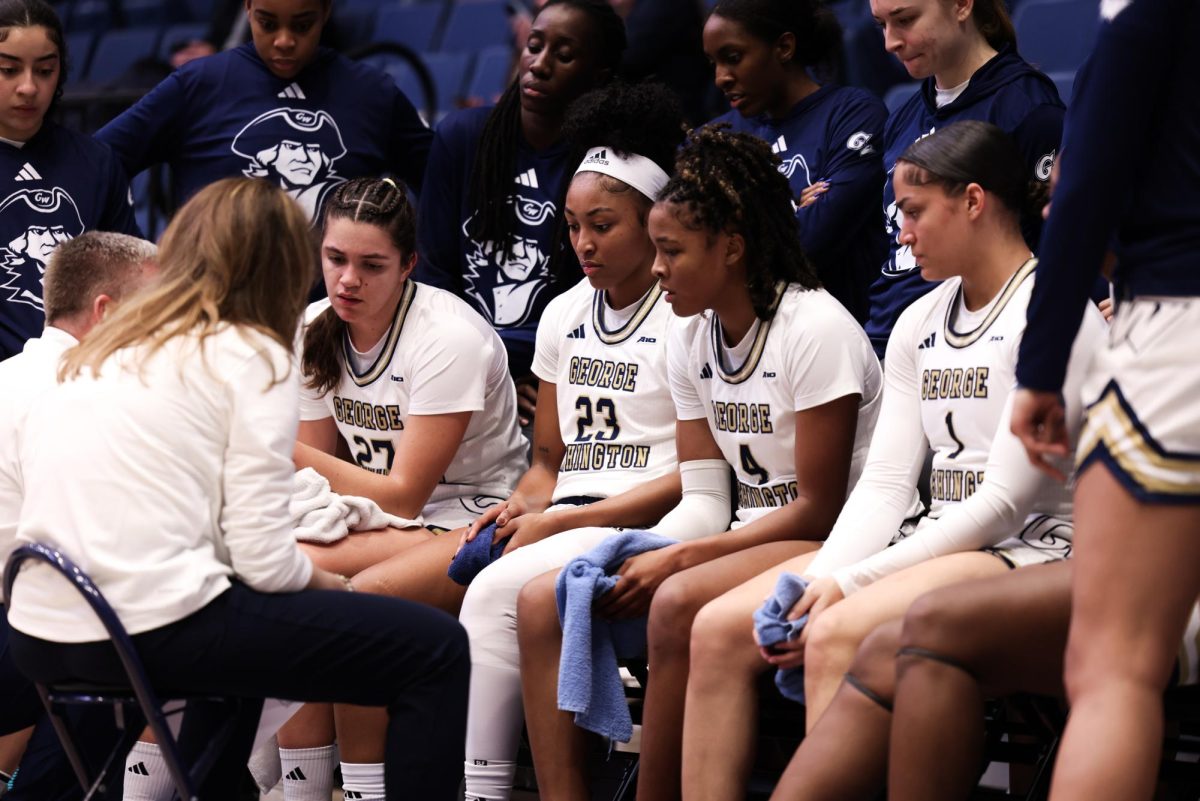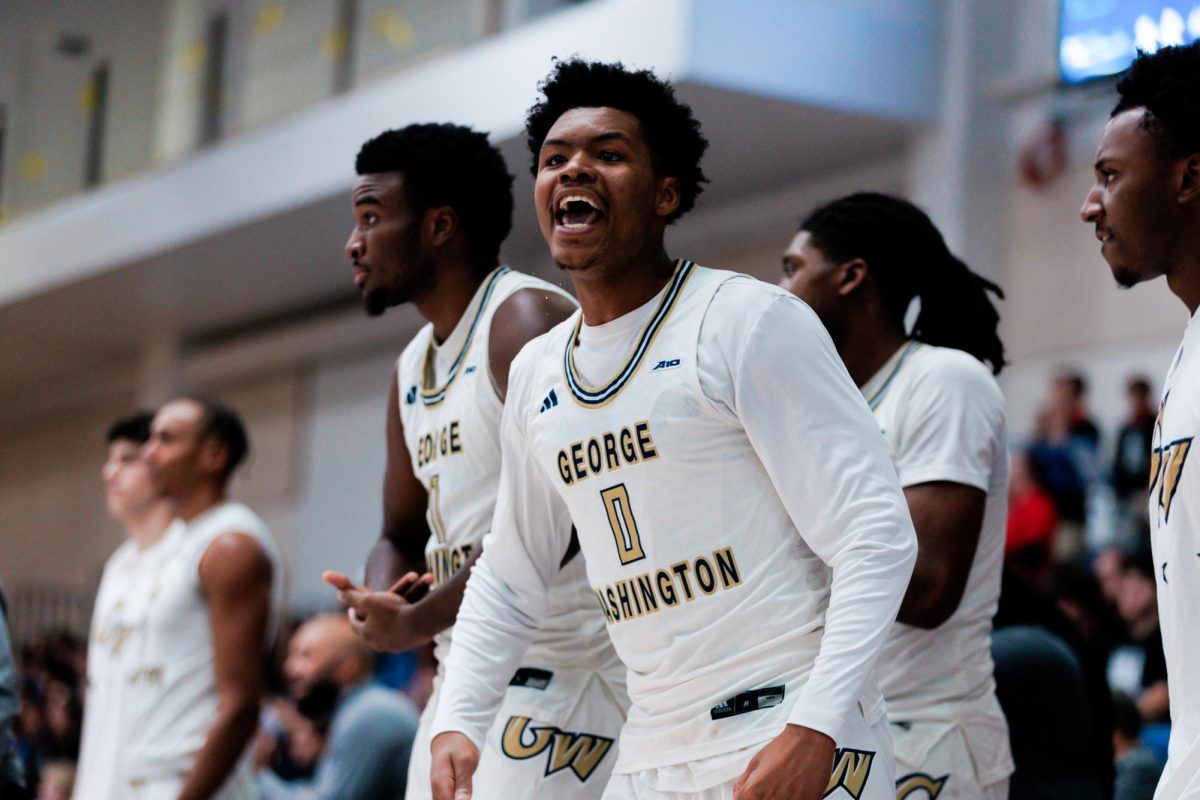As Mike Jarvis moseyed across Tex Silverman Court Saturday afternoon, the past raucously met the present.
“This is home, this is family,” said a smiling Jarvis, who returned to work the GW-Richmond game as an ESPN analyst for the first time last weekend. “There are just a lot of people who I respect and love here.”
From the looks of it, people here respect and love him right back. He shook dozens of hands and said hello to dozens of people. The sellout Smith Center crowd even chanted “we love Jarvis” in its most coordinated effort of the season.
It was as if he never left.
And for a while, his absence created a canyon-like void that made most wish for his immediate return.
He was the program’s modern architect, taking the Colonials to the NCAA Tournament four times from 1990 to 1998. Not once did any of his GW squads finish with a losing record in his eight years in Foggy Bottom.
Now, 15 years after Jarvis (“Jahvis” to anyone who knows where he’s from) began to resurrect the program, Karl Hobbs is emphatically putting his stamp on things. Now, after five years of dormancy, the present is catching up with its past. Now, the Colonials (15-5, 7-3 Atlantic 10) are officially back.
So now, the master builder comes to visit. Did he really think they’d be on the cusp of the Big Dance right now?
“I never expected a drop off,” said Jarvis, who took the St. John’s job in 1998. “I thought the level we had gotten to that Karl has now gotten back to, was the level I always thought they’d be at.”
He was right at first. Under first-year coach Tom Penders, the Colonials made the tourney in 1999. Then, the program punched itself in the mouth. There were two straight sub-par seasons (15-15 in 1999-2000, 14-18 in 2000-01). There was a player phone card scandal involving an assistant coach. There was Attila Cosby’s sexual abuse trial. Battleship sunk. Or so many thought.
They were right at first. The Hobbs squad toiled in obscurity for two years. Be patient, he said. Then last year came, and the Colonials improved to 18-12. In a three-year period, the Colonials rebuilt, re-tooled and rose up from the depths. Even at GW, a campus without a Comcast or MCI Center to show recruits, he has succeeded in finding players from basketball Meccas.
Carl Elliott from Brooklyn. Mike Hall from Chicago. Omar Williams and Maureece Rice from Philadelphia. All Hobbs’ guys. All golden tickets that have helped the coach live up to his reputation. Connecticut’s Ray Allen, Richard Hamilton, Caron Butler? All Hobbs’ guys, all lured in when Hobbs was an assistant at UConn.
The current GW coach certainly did not learn his approach from Jarvis. Back in the dinosaur age of the 1990s, he looked overseas for talent. When he left in 1998, nine international players filled out the roster.
“We had to do something different,” Jarvis said. “At that time no one was recruiting international players. We were one of the first schools to do it. Once they saw the success that we were having, others started. We probably were as much responsible for the international emergence here in college basketball as anybody.”
“Nobody in the history of college basketball had that,” he added. “We revolutionized recruiting internationally at GW.”
Indirectly, this may have led to GW’s current method of talent evaluation. Now, Hobbs said last week at practice, most of the great international players go pro. And if they don’t, bigger and higher profile programs swallow them up. When the big guys want imports, the little guys have a better shot at domestics.
“We’ve been able to go out and get good players,” said Hobbs, who also pointed to the fact that now, his program is competing with a bevy of new arenas across the league. When Jarvis coached, there was no Liacouras Center at Temple or Ryan Center at Rhode Island. Xavier and Dayton weren’t even in the league until 1995-96. Virginia Tech was also an A-10 member back then before migrating to the Big East, then the ACC.
This doesn’t necessarily mean competing was easier or harder during the Jarvis era; it was just different. Jarvis himself is quick to point out the differences between his and Hobbs’ squad.
“This team is more athletic than any team I had,” he said. Point guard play made his teams strong. At this point, Jarvis said, Carl Elliott is not at Shawnta Rogers’ status – yet.
One thing’s for sure – Jarvis is still a fan.
“I will never be objective,” he said. “I’ll always be rooting for GW.” But trust me, Jarvis still wants to keep his job at ESPN.
“When I do the game, I will be objective. But when they’re playing well, I’ll be their biggest fan. And when they’re not playing well I’ll be critical.”
Saturday, he really had no reason to be critical. The Colonials weathered a mid-game Richmond run and dominated the second half. Jarvis did not appear surprised by this. He is, however, surprised by Hobbs’ animated demeanor on the sidelines.
The two actually go way back. All the way to the disco era, when the elder was a coach at Rindge and Latin High School in Cambridge, Mass., and Hobbs was a high school superstar. He was a smooth point guard back then, so smooth, he beat out teammate Patrick Ewing for the title of Massachusetts School Boy Player of the Year in 1980.
“He was Mr. Cool,” Jarvis said of Hobbs. “He was so laid back, except when the game was really on the line. He’s just so different as a coach than as a player.”
I wondered if Hobbs had asked Jarvis for advice before taking the GW job. He gave me a quick “no.” At the time, Kevin Clark, who was Jarvis’s assistant at St. John’s, was vying for the job.
That aside, Hobbs admires his old coach.
“What makes him so good is that he’s a great communicator,” he said of Jarvis, who on Saturday, talked just about everybody who wanted to at the Smith Center.
This obviously makes him a natural for television. Still, he does not rule out a return to coaching. He said he’s committed to learning the broadcast trade, but he is a coach first and foremost.
At GW, that meant past glory. But at St. John’s, glory faded away quickly. His players reportedly visited a strip club and were accused of rape, but those charges were dropped. The NCAA also investigated the claim that a former player was paid monthly by an assistant coach. To compound this, the Red Storm limped out to a 6-21 record last season, and St. John’s fired Jarvis in December of 2003.
Still, he does not seem bitter or discouraged now. The past can haunt a person, but not Jarvis. Just ask the GW crowd, who showed him much love Saturday.
He is part of the program’s past, and he is admiring its present success. But what about its future?
“I predict this team will make the Sweet 16,” said Jarvis, who led the Colonials there in 1993. I suppose it was his way of saying “good luck.”






